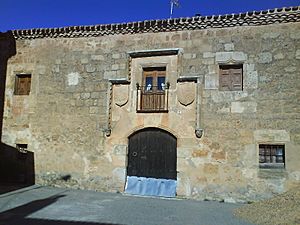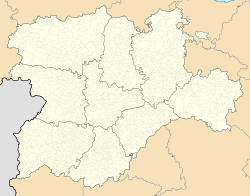Fuentepinilla facts for kids
Quick facts for kids
Fuentepinilla
|
|
|---|---|

Palace of Fuente Pinilla
|
|
| Country | |
| Autonomous community | |
| Province | |
| Municipality | Fuentepinilla |
| Area | |
| • Total | 52 km2 (20 sq mi) |
| Population
(2018)
|
|
| • Total | 88 |
| • Density | 1.692/km2 (4.38/sq mi) |
| Time zone | UTC+1 (CET) |
| • Summer (DST) | UTC+2 (CEST) |
Fuentepinilla is a small and charming municipality located in the province of Soria, which is part of the Castile and León region in Spain. It is a quiet place, perfect for those who enjoy nature and history. According to a 2004 count, about 142 people lived there. By 2018, the population was 88.
Contents
Where is Fuentepinilla?
Fuentepinilla is found in the central-northern part of Spain. It is located in the province of Soria. This province is known for its beautiful natural areas. It also has many historic towns. The region of Castile and León is the largest autonomous community in Spain. It has a rich history and culture.
Geography and Landscape
Fuentepinilla covers an area of about 52 square kilometers. This is roughly 20 square miles. The landscape around Fuentepinilla is typical of the Soria province. You might see rolling hills and open fields. There are also areas with forests. The climate here usually has warm summers and cold winters.
Life in a Small Municipality
Living in a small municipality like Fuentepinilla is often very different from living in a big city. The community is usually very close-knit. Everyone knows each other. Life moves at a slower pace. People often enjoy outdoor activities. These can include hiking or exploring nature.
History of the Area
The area around Fuentepinilla has a long history. Like much of Spain, it has seen many different cultures. These cultures have left their mark over centuries. The region of Castile and León was very important in Spanish history. It was home to powerful kingdoms.
Ancient Times
Before modern Spain, different groups lived here. These included ancient Iberian tribes. Later, the Roman Empire came to control the area. The Romans built roads and towns. They also brought their language and laws. You can still find Roman ruins in some parts of Spain.
Medieval Period
During the Middle Ages, the area was part of Christian kingdoms. These kingdoms fought to reclaim land from Moorish rule. This period shaped much of Spain's culture. Many castles and old churches were built then. They show the rich history of the region.
Local Government
A municipality like Fuentepinilla has its own local government. This government helps manage the town. It makes decisions about local services. These services include things like roads and public spaces. The people of the municipality elect their leaders. These leaders work to improve life for everyone.
How Municipalities Work
In Spain, a municipality is a basic local division. It is similar to a town or city. Each municipality has a mayor and a council. The council members are chosen by the people. They work together to make rules and plans. Their goal is to serve the community.
What to See in Fuentepinilla
While Fuentepinilla is small, it has its own charm. The image in the infobox shows the Palace of Fuente Pinilla. This historic building is a notable landmark. It reminds visitors of the area's past. Exploring the village streets can also be a pleasant experience. You might discover old stone houses.
Natural Beauty Nearby
The province of Soria is known for its natural beauty. There are many parks and natural spaces. These are great for outdoor adventures. You can go hiking, birdwatching, or just enjoy the peaceful surroundings. The clean air and quiet make it a perfect escape.
Population Changes
The population of Fuentepinilla has changed over time. In 2004, there were 142 residents. By 2018, this number had decreased to 88. Many small rural areas in Spain have seen similar changes. Young people sometimes move to bigger cities for work or study. This can lead to a smaller population in villages.
Why Populations Change
Population changes are a common trend in many countries. Economic opportunities often draw people to urban areas. However, small towns like Fuentepinilla still hold a special place. They preserve traditional ways of life. They also offer a peaceful environment.
See also
 In Spanish: Fuentepinilla para niños
In Spanish: Fuentepinilla para niños
 | Madam C. J. Walker |
 | Janet Emerson Bashen |
 | Annie Turnbo Malone |
 | Maggie L. Walker |



